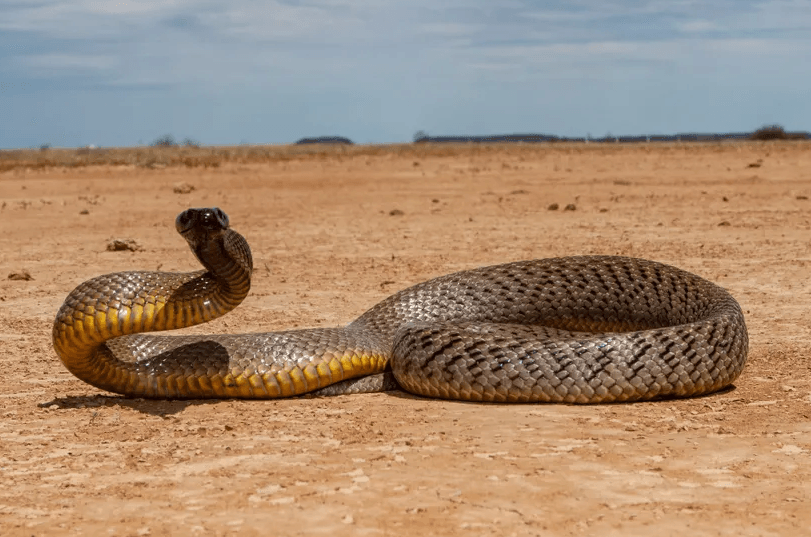Venomous snakes are still the most feared creatures today because snake bites are responsible for more than 138,000 human deaths yearly! From the deadly saw-scaled viper to the highly respected Indian cobra, the article is a complete guide on the deadliest and most venomous snakes in the world. So, fear not and buckle up to discover the deadliest snakes!
Most Venomous Snake in the World:
Undoubtedly, all snakes are dangerous and harmful. You should try your best to avoid them at any cost. There are 3900 snake species. Out of these, only 725 are venomous, and 250 of these snakes can kill humans with only one bite. Frightening!
Venomous snakes are responsible for most human deaths worldwide after mosquitos. The venomous snake bite results in immediate death if not treated timely. However, if the victim is lucky enough to escape death, it can still result in necrosis, leading to gangrene and limb amputation.
Here are the Most Venomous Snake Worldwide:
The list of 10 most venomous snakes worldwide:
Inland taipan
Saw-scaled viper
Black mamba
Russell’s Viper
Common krait
Indian cobra
Puff adder
Common death adder
King cobra
Eastern Diamondback Rattlesnake
10 most poisonous snake
Inland taipan:
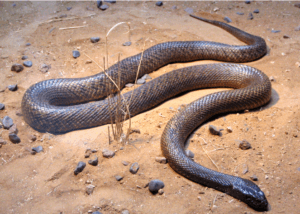
Inland taipan
Do you want to know the deadliest snake in the world? The word deadly can have two meanings in the context of venomous snakes: it may mean the snake that causes the most deaths, or it may mean the most venomous snake, toxic enough that if it bites you, it will kill you.
The Inland taipan is the most toxic snake in the world. But, it doesn’t cause as many deaths as saw-scaled viper because it hardly comes in contact with humans.
Scientific Name: Oxyuranus microlepidotus
Deaths per year: Unknown, but likely low due to remote habitat and effective antivenom
Nature: Highly venomous but typically shy and not aggressive
Length: Up to 2.8 meters (9.2 feet)
Where is it found: Central and Eastern Australia
Saw-scaled viper:
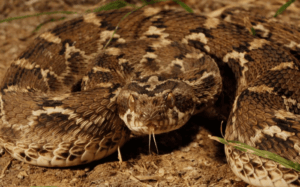
Saw-scaled viper
The Saw-scaled Viper is the deadliest snake in the world. It’s an extremely aggressive species found in densely populated areas such as India, Africa, and the Middle East.
Scientific Name: Echis carinatus
Deaths per year: 5000 human deaths in India only yearly.
Nature: Highly venomous and aggressive
Length: Up to 60 cm (24 inches)
Where is it found: Africa, the Middle East, and parts of India
Black mamba:
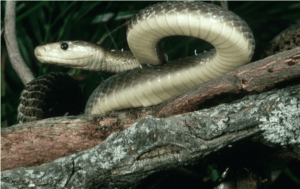
Black mamba
The black mamba is the most Venomous snake in the world. The black mamba derives its name from the blackened inside of its mouth. The venom of black mamba is very potent. The people in the Sub-Saharan feared this deadliest snake the most because of its venom. The Black mamba is an extremely aggressive species.
It doesn’t attack humans naturally, but if it’s imitated, threatened, or provoked, it will attack repeatedly. The black mamba is known for its quick speed. It’s surely an animal you need to avoid.
The bite of black mamba results in muscle twitching and slurred speech immediately after the bite. If this situation persists without treatment, the victim can pass away within 30 minutes. The deadly black mamba has a 100% mortality rate.
Scientific Name: Dendroaspis polylepis
Deaths per year: Unknown, but likely high due to its potent venom and aggressive nature
Nature: Highly venomous and aggressive, known for its speed and nervous disposition
Length: Up to 3.2 meters (10.5 feet)
Where is it found: Sub-Saharan Africa
Russell’s Viper:
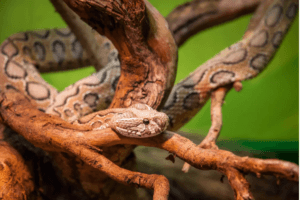
Russell’s Viper
Russell’s Viper is one of the most venomous snakes in the world. The Russel’s viper is the most hungry snake that bites humans. It has an aggressive nature that makes it even more deadliest.
Do you know that the four deadliest snakes have been categorized into a group known as “The Big Four”? Russel’s viper is one of these big four; the other three are: Any guesses? Yes, it’s the deadliest saw-scaled viper, Indian cobra, and the common krait.
Fact: These 4 snakes, known as the big four, are responsible for the most snake bite deaths in India.
Out of these 4 big snakes, Russel’s viper tops the list of venomous snakes in India because it’s responsible for 43% of snake bites in the region.
All thanks to medicine, an antivenom has been developed against these deadly snakes. Still, the treatment majorly depends on the intensity of the snake bite and the victim reaching the hospital. The shorter it is, the greater the chances of survival.
Scientific Name: Daboia russelii
Deaths per year: Estimated to cause more human deaths than any other snake species
Nature: Highly venomous and aggressive, responsible for a large number of snakebite fatalities
Length: Up to 1.9 meters (6.2 feet)
Where is it found: India, Sri Lanka, Bangladesh, Pakistan, and parts of Southeast Asia
Common krait:
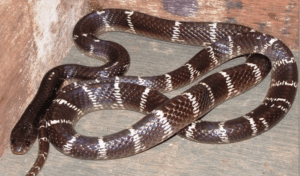
Common krait
Common Krait is a member of “ The Big Four.” It’s the most venomous snake in the world and has highly toxic venom. It has a mortality rate of around 80%.
A strange fact: Though its venom is highly toxic, its bite is not often painful. Sadly, this develops a false hope in the victim, usually leading to false reassurance.
The toxic venom of Common Krait consists of highly strong neurotoxins that cause muscle paralysis, respiratory failure, and ultimately death!
Another important fact about the Common krait is that it’s a nocturnal animal, meaning it hunts small snakes and other mammals and frogs at night. So, it’s very rare and unfortunate if you encounter this deadly snake unless you go out in the forest in the dark.
Scientific Name: Bungarus caeruleus
Deaths per year: Unknown, but contributes significantly to snakebite fatalities in India
Nature: Highly venomous and nocturnal, with a calm demeanor but capable of inflicting fatal bites
Length: Up to 1.5 meters (4.9 feet)
Where is it found: India, Nepal, Bangladesh, Pakistan, and Sri Lanka
Indian cobra:
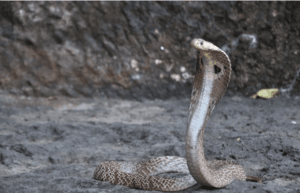
Indian cobra
The sixth most venomous snake on the list is the Indian cobra. This snake has a special place in Hindu culture and is a highly respected, feared, and revered animal in India. However, the Indian cobra is a part of the big four and is highly deadly. The venom of the Indian cobra is highly toxic. Unfortunately! This venomous snake encounters humans frequently because it hunts rodents in populated areas.
Scientific Name: Naja naja
Deaths per year: Unknown, but contributes significantly to snakebite fatalities in India
Nature: Highly venomous and responsible for many human deaths, but often displays a defensive posture before striking
Length: Up to 2 meters (6.6 feet)
Where is it found: Indian subcontinent, including India, Pakistan, Nepal, Bangladesh, and Sri Lanka
Puff adder:
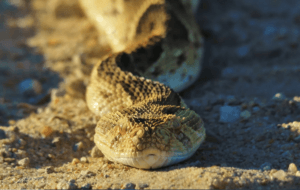
Puff adder
The large and frightening puff adder is our list’s seventh most venomous snake.
Fact: The puff adder is a species of viper. It’s responsible for more fatalities than any other African snake.
This deadly snake is very dangerous because it has a habit of basking on footpaths. Before it bites you, it’ll give you a clear warning by inflating its body and hissing loudly. But once you threaten or provoke this venomous snake, it’s unlikely to be saved from its bite! Luckily, the untreated mortality rate is less. Serious bites by puff adder can cause necrosis and gangrene. Both these deadly results can lead to losing digits and limbs.
Scientific Name: Bitis arietans
Deaths per year: Unknown, but responsible for a high number of snakebite fatalities in Africa
Nature: Highly venomous and aggressive, often found in open areas and responsible for many human deaths
Length: Up to 1.9 meters (6.2 feet)
Where is it found: Sub-Saharan Africa
Common death adder:
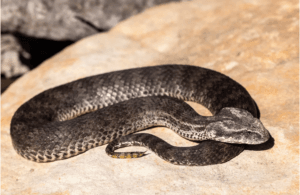
Common death adder
The most venomous snake, the common death adder, is found in Australia. Luckily, this poisonous snake is not very aggressive. Unfortunately, it has camouflage skills, i.e., it can cover itself in leaves to hunt its prey. It’s especially dangerous for adventure seekers who visit forests, woodlands, and grasslands because if you step on it accidentally, it’s your fate to be saved.
The common death adder has the most potent venom. The untreated mortality rate is 60%. Invasive cane toads eat this deadly snake.
Scientific Name: Acanthophis antarcticus
Deaths per year: Unknown, but likely responsible for a significant number of snakebite fatalities in Australia
Nature: Highly venomous and ambush predator, with a cryptic appearance and quick strike
Length: Up to 70 cm (28 inches)
Where is it found: Eastern and Central Australia
King cobra:
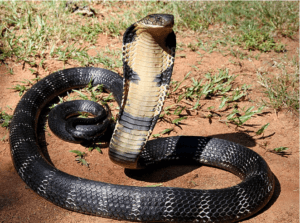
King cobra
King Cobra is the most venomous snake in the world. It is also the world’s largest venomous snake because it has an impressive four-meter height on average, with a maximum record of 5.85 meters.
Like the Indian cobra, the king cobra also has great significance in India. It’s the national reptile of India. Killing a king cobra in India is a serious offense.
Unfortunately, The king cobra is highly threatened because of habitat destruction and its overuse in Traditional Chinese Medicine.
Scientific Name: Ophiophagus hannah
Deaths per year: Unknown, but likely responsible for a significant number of snakebite fatalities in its range
Nature: Highly venomous and the world’s longest venomous snake, with a diet primarily consisting of other snakes
Length: Up to 5.5 meters (18 feet)
Where is it found: India, Southeast Asia, southern China, and parts of the Philippines
Eastern Diamondback Rattlesnake:
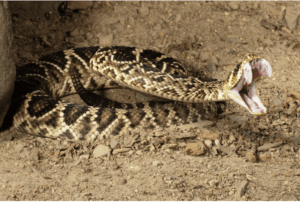
Eastern Diamondback Rattlesnake
The Eastern Diamondback Rattlesnake is the most venomous snake on our list today, but it’s the first American snake. In fact, the eastern diamondback rattlesnake is the deadliest snake in North America. It’s a particularly large and heavy snake with a weight of more than 15.4kgs.
The Eastern Diamondback Rattlesnake has a highly potent venom. The venom has harmful hemotoxin, damaging red blood cells and causing tissue damage. This deadly snake has a mortality rate of 20%.
Scientific Name: Crotalus adamanteus
Deaths per year: Difficult to pinpoint exact numbers, but historically responsible for a significant portion of snakebite fatalities in the United States
Nature: Highly venomous and aggressive when threatened, often found in sandy or flatwood habitats
Length: Up to 2.4 meters (7.9 feet)
Where is it found: Southeastern United States, primarily in coastal plains
What is the most venomous snake in the world?
The most venomous snake in the world is the saw-scaled viper. It’s responsible for 5000 human deaths annually in India only. It’s an extremely aggressive species.
Top 1 Dangerous Snake in the World:
The top 1 dangerous snake in the world is none other than the Saw-scaled viper. The scaled viper is the most venomous snake in the world. It’s responsible for most human deaths caused by snakebites. Only in India, it is responsible for causing 5000 human deaths annually.
Most Poisonous Snake:
The most poisonous snake in the world is Inland Taipan. It has a highly poisonous venom, but luckily, its death rate is lower than that of other toxic snakes because it rarely interacts with humans.
Deadliest Snake in the World:
The Deadliest snake in the world is Inland Taipan because of its potent venom. A 1996 study by Ernst and Zug et al. concluded that they have a murine LD value of 0.02 mg/kg SC in their venom, which makes it the most venomous snake in their study, too. The Inland taipan yields 44 mg of venom on average.
More info: 20 Weird Animals: A Look at Nature’s Most Unusual Species
Conclusion:
The most venomous snake in the world is Inland Taipan. The longest venomous snake in the world is King Cobra. The article is a thorough guide on the details of most venomous snakes you must avoid. Stay safe!
